Certain historical statues have been disappearing in Thailand, but they are not effigies of colonialists or slave owners torn down by protesters.
Instead, Thailand’s vanishing monuments celebrated leaders of the 1932 revolution that ended absolute monarchy in Thailand, who were once officially honored as national heroes and symbols of democracy.
Reuters has identified at least six sites memorializing the People’s Party that led the revolution which have been removed or renamed in the past year.
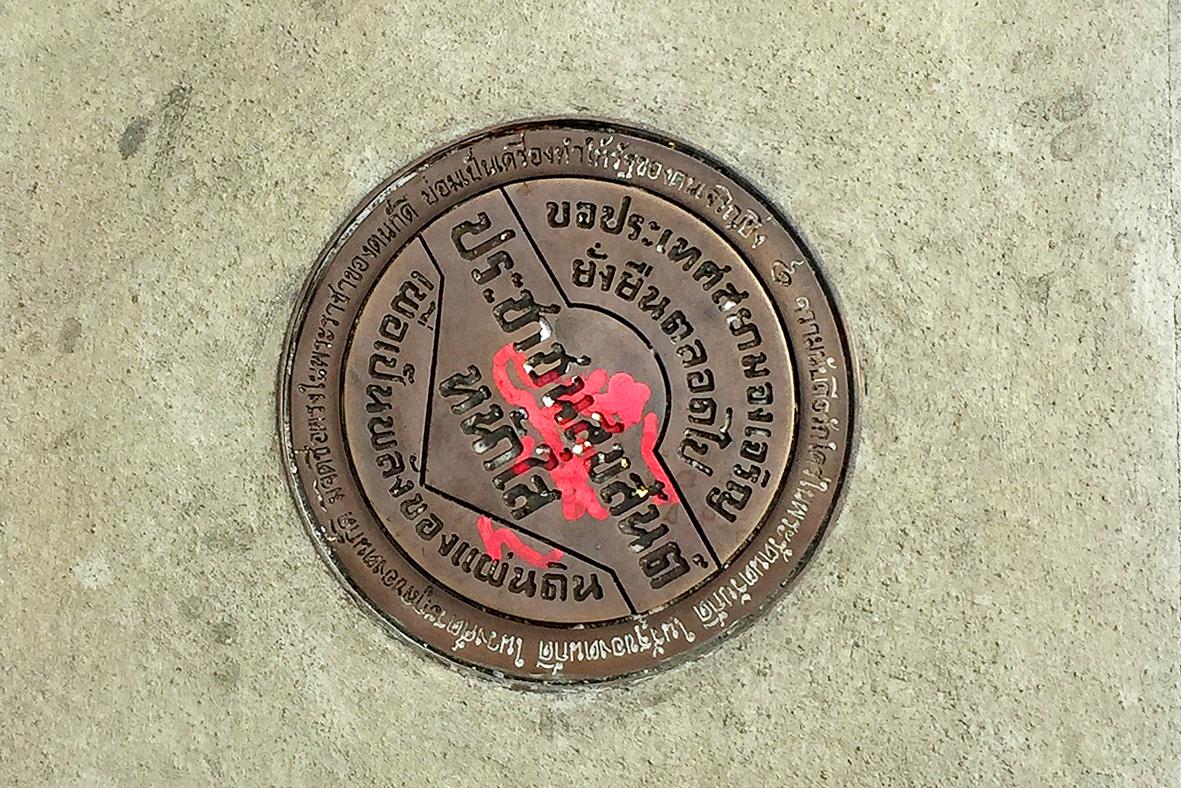
Photo: REUTERS
In most cases it is not known who took the statues down, although a military official said one was removed for new landscaping.
Two army camps named after 1932 leaders were rechristened on the orders of the office of Prime Minister Prayuth Chan-ocha, according to an item published without comment in the Royal Gazette.
Officials in the military, government and the palace declined to answer questions regarding the removal of statues and renaming of military camps.
Some historians say the missing monuments reflect an ideological battle over Thailand’s history.
On one side is military-royalist conservatives whose supporters idealize traditional culture, with loyalty to the monarchy and King Maha Vajiralongkorn seen as the highest virtue.
On the other are populist parties, activists and academics who have risen to prominence in the last two decades, culminating in two military coups that ousted elected populist governments in 2006 and 2014.
In recent years, the conservatives have been in the ascendancy. Elections last year kept coup leader Prayuth in power through a vote that opposition parties said was rigged — an accusation that he and Thailand’s courts deny.
Since the election and last year’s elaborate coronation of King Vajiralongkorn, a major People’s Party monument in Bangkok and at least three prominent statues of People’s Party leaders at military sites have been removed, and a museum commemorating the revolution in the northern city of Chiang Rai was renamed.
Months after King Vajiralongkorn took the throne, a plaque marking the spot where the 1932 coup was proclaimed was replaced with one bearing a royalist slogan. No explanation for the change was given.
A representative of the National Defense Studies Institute — where a statue of 1932 revolutionary Plaek Phibunsongkram disappeared in January from the front of its headquarters — said on condition of anonymity that it had been moved for landscaping outside and could not say when or if it would be returned.
PEOPLE’S CONSTITUTION
Thailand officially has been a constitutional monarchy since 1932, and its traditional culture is deeply invested in the monarchy as a unifying — and for some, semi-divine — institution.
The king remains powerful and the late King Bhumibol Adulyadej, the current monarch’s father, was widely revered during his 70-year reign until his death in 2016.
Tradition mandates all Thais prostrate themselves before the king and his immediate family, and insulting the monarchy is punishable by up to 15 years in prison.
In recent years, successive military leaders including Prayuth have portrayed their critics as potential threats to the monarchy.
But since last year’s disputed election, demonstrations against military dominance have increasingly identified with the 1932 revolution, said Chatri Prakitnonthakan, an architectural historian at Silpakorn University.
Wednesday was the 88th anniversary of the revolution, and pro-democracy activists defied coronavirus bans on gatherings to protest what they say is the subversion of the principles of democracy by the military.
“We want to commemorate the 1932 revolt,” said activist Anon Nampa, who is organizing a pre-dawn protest at Bangkok’s Democracy Monument, the largest and most prominent remaining symbol of the 1932 revolt.
“I think the young generations are looking back at that era and draw parallels about today, about how power is being abused.”
In remarks on Tuesday, Prayuth did not directly address the protests, but he told people “don’t violate the monarchy and don’t violate the law.”
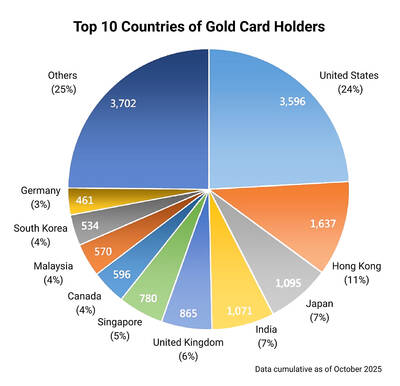
Seven hundred job applications. One interview. Marco Mascaro arrived in Taiwan last year with a PhD in engineering physics and years of experience at a European research center. He thought his Gold Card would guarantee him a foothold in Taiwan’s job market. “It’s marketed as if Taiwan really needs you,” the 33-year-old Italian says. “The reality is that companies here don’t really need us.” The Employment Gold Card was designed to fix Taiwan’s labor shortage by offering foreign professionals a combined resident visa and open work permit valid for three years. But for many, like Mascaro, the welcome mat ends at the door. A
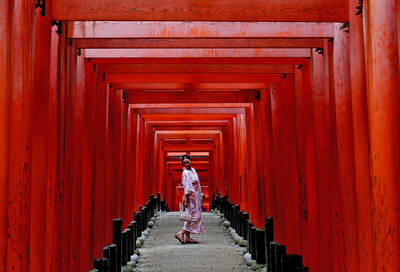
The Western media once again enthusiastically forwarded Beijing’s talking points on Japanese Prime Minister Sanae Takaichi’s comment two weeks ago that an attack by the People’s Republic of China (PRC) on Taiwan was an existential threat to Japan and would trigger Japanese military intervention in defense of Taiwan. The predictable reach for clickbait meant that a string of teachable moments was lost, “like tears in the rain.” Again. The Economist led the way, assigning the blame to the victim. “Takaichi Sanae was bound to rile China sooner rather than later,” the magazine asserted. It then explained: “Japan’s new prime minister is
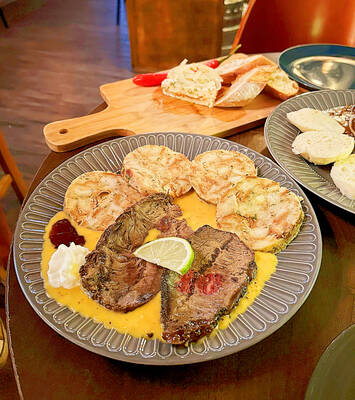
Divadlo feels like your warm neighborhood slice of home — even if you’ve only ever spent a few days in Prague, like myself. A projector is screening retro animations by Czech director Karel Zeman, the shelves are lined with books and vinyl, and the owner will sit with you to share stories over a glass of pear brandy. The food is also fantastic, not just a new cultural experience but filled with nostalgia, recipes from home and laden with soul-warming carbs, perfect as the weather turns chilly. A Prague native, Kaio Picha has been in Taipei for 13 years and
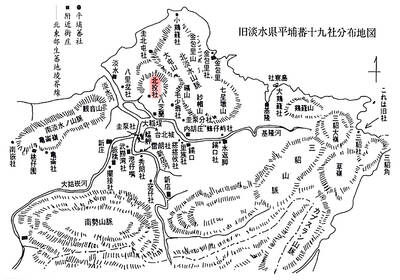
NOV. 24 to NOV. 30 It wasn’t famine, disaster or war that drove the people of Soansai to flee their homeland, but a blanket-stealing demon. At least that’s how Poan Yu-pie (潘有秘), a resident of the Indigenous settlement of Kipatauw in what is today Taipei’s Beitou District (北投), told it to Japanese anthropologist Kanori Ino in 1897. Unable to sleep out of fear, the villagers built a raft large enough to fit everyone and set sail. They drifted for days before arriving at what is now Shenao Port (深奧) on Taiwan’s north coast,